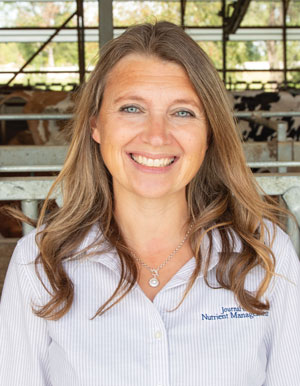
Each of us is on our own journey of life. There are different people we meet along the way who share experiences with us, but the whole package of a lifetime of memories belongs to just one person.

When we work with others and try to understand their perspective, there’s a familiar saying to guide us: “Before you judge a man, walk a mile in his shoes.” The idea is that we should put ourselves in another person’s position to know where they are coming from.
Many farmers choose their profession because they like to work independently; they want to be their own boss. While that career does offer plenty of opportunities to be self-sufficient and work autonomously, no one is truly farming on their own. Agriculture is a web of experts: farmers, veterinarians, agronomists, engineers, service providers, and so many more. The expertise these individuals bring to the table help improve each farm and the agriculture industry as a whole.
The notion of understanding other viewpoints pops up a few times in this issue. On page 24, custom manure hauler Megan Dresbach shares what she believes people in her profession wish their clients realized. From equipment capabilities to regulations to balancing multiple customers, it helps manure applicators do their job if their farmer clients understand what they are capable of. Open communication was also emphasized — which is something that benefits any relationship!
Our customers have another interesting viewpoint to consider. We can gripe about the general public’s lack of knowledge about farming and where their food comes from, but their opinions of production agriculture matter. What they deem as important has direct and indirect impacts on how we raise our animals, manage our crops, care for the environment, and market our products.
The article starting on page 16 shares examples of advertising campaigns centered around consumers’ interest in sustainable agriculture. We often only get one opportunity or a few words on a label to connect with a consumer and potential customer. Putting ourselves in their shoes helps us promote a product in a way that resonates with the average American.
I recently found myself with some car trouble on a hot Sunday afternoon. As I stood in a store parking lot with the hood of my vehicle up and my two young kids in tow, a kind couple pulled up in their car and asked what was going on. Once they heard the situation, they jumped to action, calling a local automobile supply shop and then driving to the store to pick up the needed part.
Upon their return, I tried to offer them a gift in exchange for their kindness, but they adamantly refused. I thanked them again for their compassion, but it didn’t seem like enough. They didn’t know me, and I would never see them again. They certainly didn’t have to help me. But their act of kindness got me back on the road, and it served as the perfect backdrop to teach my children about generosity and the work of good Samaritans.
This experience underscored the fact that there are really good people in the world, and no doubt, agriculture is filled with folks who rally to help others in need. We often hear stories of neighbors who came together to assist after a barn fire or harvest a crop when one of their own experienced injury or death. Time and money can be in short supply for farmers, but that doesn’t stop them from jumping in to help one another.
It isn’t always possible to fully understand what another person is going through. We never know the physical, mental, or emotional battles someone may be facing in their own body or mind. But what we can do is try to support people in their times of need, and before we jump to conclusions, let’s walk a mile in someone else’s shoes — or in the case of agriculture, their boots.
Until next time,
Abby

This article appeared in the August 2024 issue of Journal of Nutrient Management on page 4. Not a subscriber? Click to get the print magazine.







